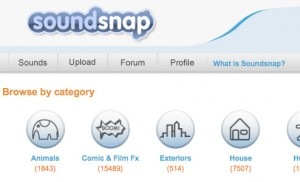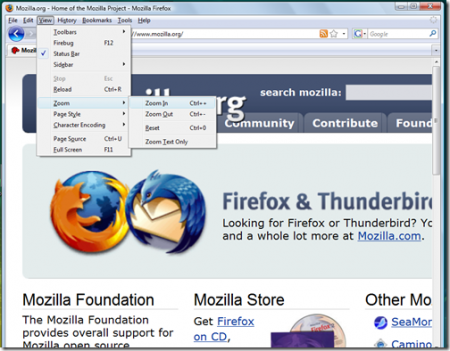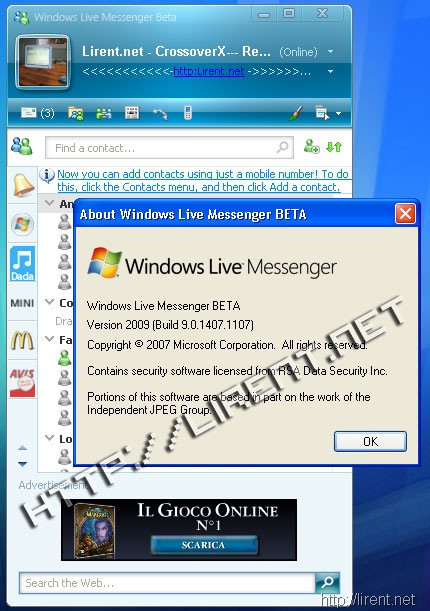10. Instant messaging
Real time communication has brought people together. Instant messaging programs such as MSN Messenger, Yahoo Instant Messenger, AIM and ICQ had exponential growth in popularilty during the 1990’s and early 2000’s and still today are the number one medium for talking to friends and relatives on the other side of the city, let alone the other side of the world. With many IM applications now supporting video and audio, international phone calls now come a distant second for tech-savvy internet users.
9. Social networking
Sadly, Myspace and Facebook are exceedingly popular. It’s something we have to deal with, and hence this is its acknowledgement. Granted, whether this is a fad or a phase that the internet is going through remains to be seen, so until social networking has cemented its place in the internet world it will have to settle with number 9. One thing that can’t be disputed though, is that Myspace and Facebook will always be remembered as the sites who began the transition into Web 2.0. They have taken user interactions to a whole new level, and for that these websites must be commended. For the terrible layouts, design and in some cases, lack of usability… well, what can I say?
8. Online banking
This sort of slips beneath the radar when thinking about things which changed the way we live, but if truth be known, accessing our bank accounts from the convenience of our living room is something that millions of people are doing. There are the obvious concerns with security though, and until all of these issues are addressed there will always be a group of people wary of entering the world of online banking, and this will halt its progress for some time yet. At the moment, security tokens are being trialed by some financial institutions. These are devices which generate a temporary password which only the genuine owner has access to for a short period of time. Absolutely, this is a step in the right direction.
7. Paypal
Paypal is almost universally accepted by online stores and businesses, and it is not hard to see why. The majority of Paypal users have a troublefree, secure experience every time they shop. The convenience of purchasing in a range of currencies without entering credit card details is a favourable option to many people, and since the eBay takeover in 2002 Paypal has gone from strength to strength, with many of its competitors (such as BidPay and PayDirect) since closing their services.
6. Hotmail
Hotmail paved the way forward for email. It was among the first free webmail providers, and until its launch in 1996, users were almost always forced to use the standard email addresses supplied by internet service providers. Since then though, Hotmail has revolutionised the way we use email and webmail, including the ability to read email from any computer in the world with an internet connection. After many years of essentially plateauing, Hotmail was forced to up the ante when Google’s Gmail service went online offering much more comprehensive features than Hotmail’s, such as better spam protection and several gigabytes of space, when Hotmail only offered 2 megabytes. More recently, Hotmail has utilised AJAX and other so called “Web 2.0” type functionality and seems to be in a transition phase.
5. Napster
The rise and fall of Napster was a catalyst for change in the music industry. Napster created a generation of people who would prefer to download music online rather than go to a CD store and buy a hard copy. Unfortunately for Napster users, it’s lifetime was short lived, when US courts ordered its closure early in the decade. But its legacy well and truly lived on through programs such as WinMX, Kazaa and Limewire – all of which became immensely popular. Indirectly, Napster also played a role in the creation of legal download services, such as iTunes, and for a short while, themselves.
4. Wikipedia
With Wikipedia, the world is literally at your fingertips. Wikipedia has become the single largest collaborative effort on the internet, and as such it’s following is huge. It is among the most visited websites on the internet, but has received its fair share of criticism. Due to its open nature, anybody can contribute, thus creating question marks over the accuracy of some articles. Some countries, such as China, have blocked access to the website due to the negative articles towards the Chinese government. At the moment, the number of articles added simply continues to grow but this is expected to slow at some point in the future.
3. Youtube
Another website firmly in the “Web 2.0” category, it’s growth in the past 3 years has been astonishing. To think that Youtube.com was created in 2005, and is now essentially part of the English language boggles the mind. Unlike Wikipedia, which will surely slow down in terms of new content being added, Youtube may not suffer in the same way. For everything wrong with Youtube (the submissions of offensive videos, cyber-bullying, promotion of real violence, etc) there are countless positives. Having been bought out by Google in 2006, its future looks very bright.
2. Google
Google is the internet. Google has changed the way we view, distribute and locate information, not only through it’s first class search engine, but through it’s many services, such as Google Groups, Google News, Youtube/Google Video and its advertising programs Adsense and Adwords. Google’s unofficial motto is “Don’t be evil”, a discrete attack at other web companies which have gained a slightly negative reputation online. Generally, Google is held in high esteem by most internet users, who almost idolise the company! It says volumes for Google that they hold themselves to ethics and standards of journalism when they are not obliged to.
1. Broadband internet
It seems strange to rank broadband above the likes of Google and Youtube, but only when you downgrade to 56k dial up do you realise how much you take high speed internet for granted. Before the turn of the century, dial up internet was standard, and download rates of 5kb per second were considered very good. As dial up is accessible by a phone line without the need for other infrustructure, it remains useful to many travellers as well as those living in rural areas, or those on low budgets. However, in recent tiems, the cost of DSL and Cable internet is dropping and is becoming more widely available. Since 2000, broadband internet has become the preferred choice for most people, and speeds get range between 500kb per second and several megabytes per second. At the moment, the most common forms of broadband are wired, including cable and ADSL, although the next step for broadband will most likely be in the form of Wi-Fi, which is gaining popularity over the world, particularly in Asia and the USA.
Honourable mentions
Other significant moments and technology which made the shortlist were the I Love You Bug, Y2K Bug, Windows XP, Ebay, Microchip Technology, Internet Forums and Internet Relay Chat.
Written by battye on cricketmx.com







